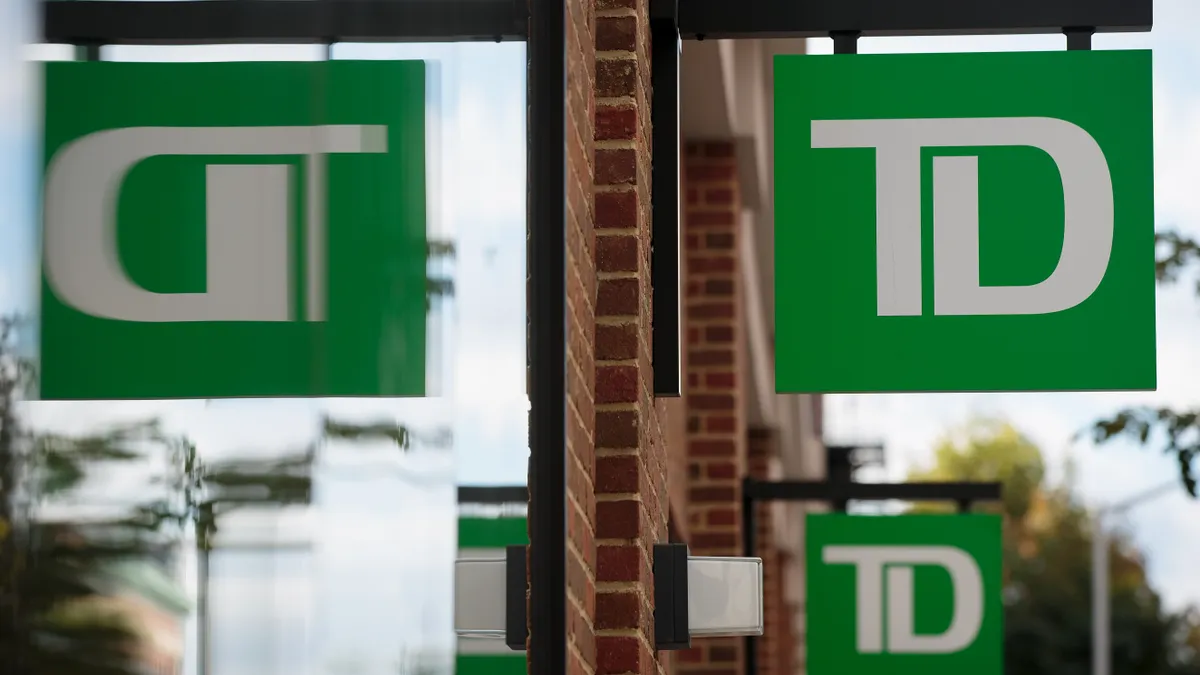Dive Brief:
- TD unveiled a five-year, $50 billion community benefits plan Wednesday, ahead of the expected close of its pending $13.4 billion acquisition of First Horizon Bank.
- The Canadian bank pledged to open at least 25 new branches and 25 ATMs in low- to moderate-income or majority-nonwhite markets over the next five years. TD also said it would not close any First Horizon branches in connection with the acquisition, and that all banking locations would be open at least five days a week.
- TD also committed to increasing residential mortgage loans by 65% — to $21 billion — for LMI and nonwhite borrowers, including in LMI and majority-nonwhite census tracts. The bank also said it would hire extra mortgage loan officers who are of diverse backgrounds.
Dive Insight:
With its community benefits plan, TD clearly has its eyes on clinching the First Horizon deal — which has seen more pronounced pushback than other multibillion-dollar tie-ups proposed around the same time.
A dozen advocacy groups, led by the Center for Responsible Lending, wrote to the Office of the Comptroller of the Currency and the Federal Reserve Bank of Philadelphia in August, urging them to curb the deal over the amount TD collects in overdraft fees.
Sen. Elizabeth Warren, D-MA, and three members of Congress wrote the OCC in June, citing a Capitol Forum report that alleged TD incentivized employees to enroll customers in new accounts and services like overdraft protection without their consent.
Community advocates at an August public hearing pushed the OCC and the Fed to make the TD-First Horizon merger contingent on a strong benefits agreement that includes more mortgage lending to borrowers of color and a steady branch presence in underserved areas.
It appears TD listened.
In a statement Wednesday, National Community Reinvestment Coalition CEO Jesse Van Tol praised the “candid, constructive energy” that led to such a “robust final package.”
“[TD] brought dedication and open minds to the meetings with NCRC members that brought us to this strong and promising agreement,” Van Tol said. "The deal we just signed will ensure that communities of need see tangible increases in resources and economic opportunity in their neighborhoods — as every bank merger is legally required and morally bound to do.”
Among the bank’s promises, TD pledged to provide $7.75 billion in lending to businesses with less than $1 million in annual revenue, with a focus on nonwhite- and women-owned companies and those in LMI and rural areas. TD on Monday announced it is launching a new credit access program geared toward Black entrepreneurs.
TD on Wednesday also said it would provide $17.5 billion in community development loans and other investments to support economic development activities and affordable housing projects in TD and First Horizon markets. That figure represents a 21% increase over the previous five-year average, the bank said.
TD also pledged $200 million in Community Reinvestment Act-related philanthropy, including creating a $40 million fund focused on giving in First Horizon’s home market of Memphis.
"Banks have an important role in providing economic opportunity and supporting changes that help [LMI], diverse and underserved communities achieve their financial goals,” Leo Salom, TD’s U.S. CEO, said in a statement. “This is rooted in the belief that our business only does well when the people we serve are flourishing.”
TD’s branch-related promise stood out to some community advocates.
"The number-one priority now is opening branches in banking deserts," Ken Thomas, president of Community Development Fund Advisors, told American Banker on Wednesday. "When it comes down to it, there is no substitute for having a branch in a community. It's a statement that the bank believes in that community."
The 25-branch growth commitment comes months after TD vowed to expand its presence in Charlotte, North Carolina, with 15 new branches by 2025.
There’s no telling when TD will get word from regulators on the status of its First Horizon tie-up. (TD CEO Bharat Masrani last month called the timetable “unknown,” according to The Globe and Mail.) The banks last week agreed to extend until May 27 the date by which the deal must close. TD executives said in December that the bank aimed to complete the transaction by April 30. TD reports its quarterly earnings March 2.
It can take months for regulators to sign off on a deal even after the acquiring bank lays out a community benefits plan. The Fed and OCC approved Bank of Montreal’s $16.3 billion acquisition of Bank of the West less than two months after BMO rolled out its $40 billion community benefits plan. It took five months, however, for regulators to green-light U.S. Bank’s $8 billion acquisition of MUFG Union Bank after the larger bank floated its five-year, $100 billion plan.















